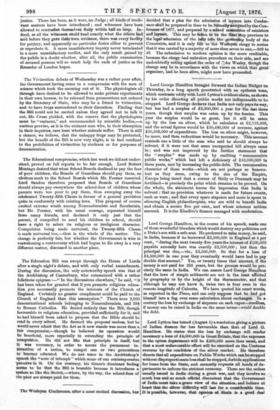The Education Bill was swept through the House of Lords
after a single night's debate, and with only verbal amendments. During the discussion, the only noteworthy speech was that of the Archbishop of Canterbury, who commenced with a rather felicitous epigram :—" In the discussions elsewhere," he said, "it has been taken for granted that if you promote religious educa- tion you necessarily promote the interests of the Church of England. Certainly no greater compliment could be paid to the Church of England than this assumption." There were 2,000 denominational schools belonging to Nonconformists, and 598 to Roman Catholics. He denied entirely that the Bill, though favourable to religious education, provided sufficiently for it, and he had himself been asked to propose that the Bible should be read in every school. He deemed the proposal useless, but he would never admit that the Act as it now stands was more than a fair compromise,—though he believed its operation would he beneficial, more especially in extending the principle of coMpulsion. He did not like that principle in itself, but It was necessary, in order to secure the permanent in- Sttuction of a nation, to compel one or two generations to become educated. We do not trace in the Archbishop's speech the "note of triumph" which some of our contemporaries perceive in it. On the contrary, his Grace's dominant feeling Bettina to be that the Bill is bearable because it introduces a system so like the Scotch,—where, by the way, the school-fees of the poor are always paid for them.






























 Previous page
Previous page